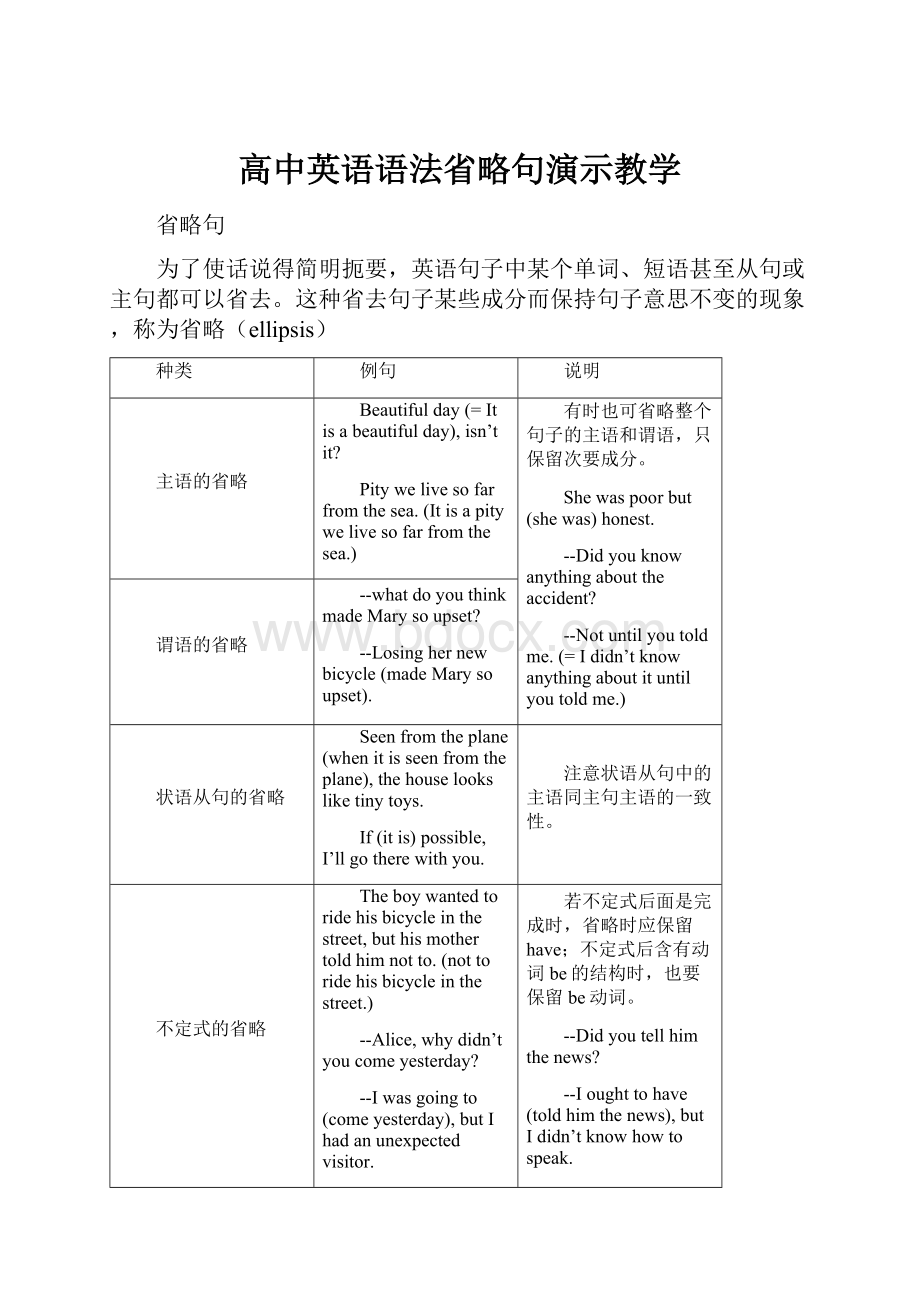高中英语语法省略句演示教学.docx
《高中英语语法省略句演示教学.docx》由会员分享,可在线阅读,更多相关《高中英语语法省略句演示教学.docx(9页珍藏版)》请在冰豆网上搜索。

高中英语语法省略句演示教学
省略句
为了使话说得简明扼要,英语句子中某个单词、短语甚至从句或主句都可以省去。
这种省去句子某些成分而保持句子意思不变的现象,称为省略(ellipsis)
种类
例句
说明
主语的省略
Beautifulday(=Itisabeautifulday),isn’tit?
Pitywelivesofarfromthesea.(Itisapitywelivesofarfromthesea.)
有时也可省略整个句子的主语和谓语,只保留次要成分。
Shewaspoorbut(shewas)honest.
--Didyouknowanythingabouttheaccident?
--Notuntilyoutoldme.(=Ididn’tknowanythingaboutituntilyoutoldme.)
谓语的省略
--whatdoyouthinkmadeMarysoupset?
--Losinghernewbicycle(madeMarysoupset).
状语从句的省略
Seenfromtheplane(whenitisseenfromtheplane),thehouselooksliketinytoys.
If(itis)possible,I’llgotherewithyou.
注意状语从句中的主语同主句主语的一致性。
不定式的省略
Theboywantedtoridehisbicycleinthestreet,buthismothertoldhimnotto.(nottoridehisbicycleinthestreet.)
--Alice,whydidn’tyoucomeyesterday?
--Iwasgoingto(comeyesterday),butIhadanunexpectedvisitor.
若不定式后面是完成时,省略时应保留have;不定式后含有动词be的结构时,也要保留be动词。
--Didyoutellhimthenews?
--Ioughttohave(toldhimthenews),butIdidn’tknowhowtospeak.
--Areyouanengineer?
--No,butIwanttobe.
Ⅰ、状语从句中的省略用法
一、如果从句的主语和主句的主语一致,且从句的谓语含有be动词的某种形式(am/is/are/was/were),可同时省略从句的主语和be动词的某种形式。
1、when,while引导的时间状语从句
e.g.Dobecarefulwhen(youare)crossingthestreet.
When/While(Iwas)onmywaytowork,Imether.
2、if,unless,once引导的条件状语从句
e.g.If(itis)properlytreated,wastewilldonoharmtotheenvironment.
I’llnotgotothepartyunless(Iam)invited.
Once(youare)caughtstealinginasupermarket,youwillbepunished.
3、though,although,whether,nomatterwhether/what/how/who等引导的让步状语从句
e.g.Hewashappy,though/although(hewas)poor.
Whether(sheis)sickorwell,sheisalwayscheerful.
Nomatterhow/Howeverhardthetask(is),wemustfulfillitintime.(注:
从句的主语和主句的主语不一致时,只省略从句中的be动词形式)
4、asif,asthough引导的方式状语从句
e.g.Herubbedhiseyesandyawnedasif/though(hewas)wakingupafteralongsleep.
Hestoodupasif/though(hewanted)toleave.(asif/though+todo表示一个将来的动作)
二、than,as引导的比较状语从句中的省略用法:
当不同的主语进行比较时,一般省略从句中的谓语;当从句中的主语与谓语(be动词除外)和主句中的主语与谓语相同时,通常省略从句中的主语和谓语,只保留比较部分。
e.g.Heistallerthanhisbrother(is).
Ihaveasmuchasconfidenceinyouas(Ihaveconfidence)inhim.
三、以if从句为代表的状语从句中的特殊省略用法:
通常省略了itis,thatis,thereis/are。
e.g.If(itis)possible/necessary,thisoldtemplewillberebuilt.
If(thatis)so,Iwillcallyoubackat5:
00pm.
Thereareonlyafewbooksinourschoollibrary,if(thereare)any.
Ⅱ、定语从句中的省略用法
关系词的省略关系代词that,which,whom等在限制性定语从句中充当宾语且不位于介词之后时,可以省略;inwhich或that在先行词way后作方式状语从句时可省略。
e.g.Theman(that/who/whom)youvisitedlastnightismygrandpa.
Idon’tliketheway(inwhich/that)youtreatthegirl.
Ⅲ、虚拟语气中if及should的省略
1、当条件状语从句中有were,had,should等时省略if,把它们提至句首,形成倒装句。
e.g.IfIwereateacher,Iwouldbestrictwithmystudents.
=WereIateacher,Iwouldbestrictwithmystudents.
2、Suggest,insist,order,require等表示建议、要求、命令的动词后接的从句中,谓语动词常用“should+动词原形”,should可以省略。
e.g.Thedoctorsuggestedthathe(should)trytoloseweight.
Ⅳ、不定式符号to的省略
1、感官动词see,hear,feel,watch等和使役动词have,make,let等后接不定式作宾语时,不定式省略to。
(一感feel,二听hear,listento,三让have,let,make,四看see,lookat,observe,watch)
2、donothingbut,can’thelpbut等结构常接省略to的不定式。
E.g.Wedidn’tdoanythingbutstayathomewatchingTVyesterday.
Hearingthenews,shecouldn’thelpbutcry.
3、在特定语境中为了避免重复,当不定式再次出现时,在want,wish,hope,try,plan,like,love,hate后往往只保留to,而省略后面的动词。
但不定式后有be,have时,也保留be和have。
E.g.Myparentsencouragedmetogotocollege,butIdidn’twantto.
Ⅴ、So和not的替代性省略
用于避免重复前面所说过的内容,替代词so/not替代肯定或否定的名词性从句。
可与believe,do,expect,fear,guess,hope,say,speak,suppose,think,I’mafraid等连用
e.g.–Doyousupposeheisgoingtoattendthemeeting?
–Isupposenot.
Ⅵ、日常交际中的省略
在情景会话中,答语常常省略不会引起歧义的主语、谓语或宾语部分,而只保留对方希望了解的内容。
在复合句或并列句中,也有省略主、谓、宾的情况。
e.g.–Howmanycopiesdoyouwant?
--(Iwant)Threecopies,please.
--HaveyoueverbeentotheGreatWall?
--No,(Ihave)never(beentotheGreatWall).
随讲随练1、—Lucy,couldyoupleasesparemeafewminutes?
—____,butIhope"afewminutes"won'tturnintoafewhours.
A.Itdoesn'tmatter B.That'skindofyou
C.I'mafraidnot D.Iguessso
2、—Hey,taxi!
—_____
—Iwanttogotothedentist's.
A.Goodmorning,sir. B.Nicetoseeyou,sir.
C.Whereto,sir?
D.Whatareyougoingtodo,sir?
3、Thedoctorexpresseshisstrongdesirethatthepatient_____immediately.
A.beoperatedon B.operatedon
C.wasoperatedon D.wouldbeoperatedon
4、Whenhecameback,hefoundthebaghehad____overtheseatwasgone.
A.lefttohang B.lefthanging C.lefthung D.toleavehanging
5、LiuXiangspokeslowlytotheSpecialOlympiccompetitorssoastohavethem____.
A.understandhim B.tobeunderstood
C.beunderstood D.tounderstandhim
6、—ArethereanyEnglishstorybooksforusstudentsinthelibrary?
—Thereareonlyafew,____.
A.ifany B.ifhave C.ifsome D.ifhas
8、—DoesBettyknowwhereherviolinis?
—Shesawsomebodywalkingoffwithone,butshedoesn'tknow____.
A.whose B.it C.whom D.which
9、—Aren'tyouthemanager?
(一)对“漂亮女生”饰品店的分析 —No,andI____.
现在是个飞速发展的时代,与时俱进的大学生当然也不会闲着,在装扮上也不俱一格,那么对作为必备道具的饰品多样性的要求也就可想而知了。
A.don'twant B.don'twantto C.don'twanttobe D.don't
10、—Howareyougettingonwithyourwork?
—Oh,I'msorry.Thingsaren'tgoingsowellas____.
(3)年龄优势A.plans B.planning C.planned D.toplan
据调查统计,有近94%的人喜欢亲戚朋友送给自己一件手工艺品。
无论是送人,个人兴趣,装饰还是想学手艺,DIY手工制作都能满足你的需求。
下表反映了同学们购买手工艺制品的目的。
如图(1-4)11、—What'sthematterwithyou?
—Ididn'tpassthetest,butIstill____.
A.hopeso B.hopeto C.hopeit D.hopethat
我们认为:
创业是一个整合的过程,它需要合作、互助。
大学生创业“独木难支”。
在知识经济时代,事业的成功来自于合作,团队精神。
创业更能培养了我们的团队精神。
我们一个集体的智慧、力量一定能够展示我们当代大学生的耐心.勇气和坚强的毅力。
能够努力克服自身的弱点,取得创业的成功。
12、Thedoctordidwhathecould___theboy,butinvain.
A.save B.tosave C.saving D.saved
13、—Youlookhappytoday,Mary.
可见“体验化消费”广受大学生的欢迎、喜欢,这是我们创业项目是否成功的关键,必须引起足够的注意。
—IlikemynewdressandMother___,too.
PS:
消费者分析A.likes B.does C.is D.do
14、—Whathappenedtotheboy?
Hewasmakingsomuchnoise.
虽然调查显示我们的创意计划有很大的发展空间,但是各种如“漂亮女生”和“碧芝”等连锁饰品店在不久的将来将对我们的创意小屋会产生很大的威胁。
—Hewantedtoplayfootball,buthismotherwarnedhim____.
我们认为:
创业是一个整合的过程,它需要合作、互助。
大学生创业“独木难支”。
在知识经济时代,事业的成功来自于合作,团队精神。
创业更能培养了我们的团队精神。
我们一个集体的智慧、力量一定能够展示我们当代大学生的耐心.勇气和坚强的毅力。
能够努力克服自身的弱点,取得创业的成功。
A.not B.to C.notto D./
送人□有实用价值□装饰□15、____foryourbrother,IwouldnothavegonetoseeMr.Wang.
A.Ifitisnot B.Wereitnot
C.Haditnotbeen D.Iftheywerenot
省略句练习
1.Whenfirst________tothemarket,theseproductsenjoyedgreatsuccess.(NMET2004全国卷II)bb
A.introducingB.introducedC.introduceD.beingintroduced
2.Itshamesmetosayit,butItoldaliewhen________atthemeetingbymyboss.(NMET2004全国卷IV)
A.questioningB.havingquestionedC.questionedD.tobequestioned
3.Themanwefollowedsuddenlystoppedandlookedasif________whetherhewasgoingintherightdirection.(NMET2003安徽春)
A.seeingB.havingseenC.tohaveseenD.tosee
4.Generallyspeaking,________accordingtothedirections,thedrughasnosideeffect.(NMET2003上海卷)
A.whentakingB.whentakenC.whentotakeD.whentobetaken
5.Unless________tospeak,youshouldremainsilentattheconference.(NMET2003上海春)
A.invitedB.invitingC.beinginvitedD.havinginvited
6.When________,themuseumwillbeopentothepublicnextyear.(NMET2002上海春)
A.completedB.completingC.beingcompletedD.tobecompleted
7.Though________money,hisparentsmanagedtosendhimtouniversity.(NMET2002上海卷)
A.lackedB.lackingofC.lackingD.lackedin
8.Theresearchissodesignedthatonce____nb____nothingcanbedonetochangeit.(NMET2002)
A.beginsB.havingbegunC.beginningD.begun
9.—You'realwaysworking.Comeon,let'sgoshopping.
—________youeverwanttodoisgoingshopping.(NMET2002北京、安徽、内蒙古春)
A.AnythingB.SomethingC.AllD.That
10.Isthisthereason________atthemeetingforhiscarelessnessinhiswork?
(NMET2002上海春)
A.heexplained
B.whatheexplained
C.howheexplained
D.whyheexplained
11.Whatsurprisedmewasnotwhathesaidbut________hesaidit.(NMET2004湖北卷)
A.thewayB.inthewaythatC.inthewayD.thewaywhich
12.Itiseasytodotherepair.________youneedisahammerandsomenails.(NMET2004天津卷)
A.SomethingB.AllC.BothD.Everything
13.That'sanunpleasantthingtosayaboutyourfatherafter________he'sdoneforyou.(NMET2004全国卷)
A.somethingB.anythingC.allD.that
14.Asyou'veneverbeentherebefore,I'llhavesomeone________youtheway.(MET1990上海卷)
A.toshowB.showC.showingD.showed
15.—I'llbeawayonabusinesstrip.Wouldyoumindlookingaftermycat?
—Notatall,________.(NMET1995)
A.IhavenotimeB.I'drathernotC.I'dlikeitD.I'dbehappyto
16.—DoesyourbrotherintendtostudyGerman?
—Yes,heintends________.(NMET1998上海卷)
A./B.toC.soD.that
17.—WouldyouliketogototheGrandTheatrewithmetonight?
—________.(NMET1999上海卷)
A.Yes,I'dliketogototheGrandTheatre
B.I'dliketo,butIhaveanexamtomorrow
C.No,Iwon't
D.That'sright
18.—Youshouldhavethankedherbeforeyouleft.
—Imeant________,butwhenIwasleavingIcouldn'tfindheranywhere.(NMET2000北京春招卷)
A.todoB.toC.doingD.doingto
19.________itraintomorrow,wewouldhavetoputoffthevisittotheYangpuBridge.(NMET1994上海卷)
A.WereB.ShouldC.Woul